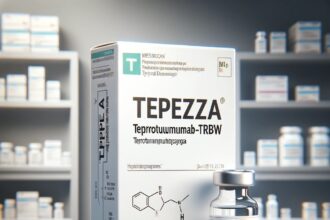Horizon Therapeutics, a well-established pharmaceutical company, has recently come under significant scrutiny due to complications linked to its drug, Tepezza. Horizon Therapeutics’ Tepezza, approved by the FDA for the treatment of Thyroid Eye Disease (TED), has become a subject of concern as patients report severe and unexpected side effects, particularly hearing loss. This emerging issue not only threatens the health and well-being of patients but also poses considerable financial and reputational risks for Horizon Therapeutics. As more patients come forward with their experiences, the company faces a growing tide of Tepezza lawsuits that could severely impact its bottom line and standing in the pharmaceutical industry.
These Tepezza lawsuits are not just a matter of financial compensation; they represent a much larger threat to Horizon Therapeutics’ reputation. A pharmaceutical company’s reputation is built on trust—trust that their products are safe, effective, and have been thoroughly vetted through rigorous clinical trials. With Tepezza now under intense scrutiny due to hearing loss claims, Horizon Therapeutics may find itself struggling to maintain the confidence of both the medical community and the public. As these cases against tepezza lawyers continue to unfold, the company’s ability to navigate this crisis will be critical to its future.
The Legal Landscape Surrounding Tepezza
The legal implications for Horizon Therapeutics are vast and complex, as the number of Tepezza hearing loss lawsuits continues to grow. Patients who have experienced adverse effects, such as hearing impairment or persistent subjective hearing loss, are filing product liability lawsuits, alleging that Horizon Therapeutics failed to adequately warn patients about the potential risks associated with the drug. Many patients have suffered hearing loss as a consequence of taking Tepezza, leading to ongoing lawsuits. These Tepezza hearing loss claims primarily center around the allegation that the company was negligent in its duty to ensure patient safety, particularly regarding the risks of potentially permanent hearing loss itself. As more evidence surfaces, the legal challenges facing Horizon Therapeutics are expected to intensify, potentially leading to significant financial settlements or judgments.
In addition to the direct legal costs, Horizon Therapeutics may also face substantial penalties if it is found that the company did not comply with regulatory requirements during the development and marketing of Tepezza. The FDA approval process is designed to ensure that drugs are both safe and effective, but if it is proven that Horizon Therapeutics withheld information or failed to conduct adequate testing, the consequences could be severe. Such findings could lead to stricter regulatory oversight and more rigorous scrutiny of the company’s future drug approvals, further impacting its operations and financial performance. The fact that Tepezza litigation is moving forward under a Tepezza hearing loss MDL (multidistrict litigation) in the Northern District of Illinois only adds to the complexity of the legal landscape for the company. Some patients have suffered permanent hearing loss, which has led to severe and potentially lifelong auditory impairments and specific lawsuits claiming inadequate warnings about these risks.
Another critical aspect of the legal challenges involves the potential for Tepezza class action lawsuits. If tepezza class action lawsuit and a significant number of affected patients band together, Horizon Therapeutics could be facing one of the largest mass tort litigation cases in pharmaceutical history. The costs associated with such litigation are not limited to settlements and legal fees but also include the potential loss of market share as competitors seize the opportunity to offer alternative treatments for thyroid eye disease. This could result in a long-term decline in revenue, exacerbating the financial strain on the company.
Reputational Damage And Its Consequences
The reputational damage resulting from the Tepezza hearing loss lawsuits could be just as damaging as the financial losses. The potential Tepezza side effects, particularly serious hearing issues, have raised significant concerns among patients and healthcare providers. In the pharmaceutical industry, reputation is everything; it influences the decisions of doctors, patients, and investors alike regarding prescription medication. With Tepezza’s safety now in question, Horizon Therapeutics risks losing the trust of these key stakeholders. Physicians may become hesitant to prescribe the drug, not only due to the potential legal repercussions but also out of concern for their patients’ safety. This could lead to a significant drop in sales of Tepezza, further diminishing the company’s market position, especially in treating thyroid eye disease.
The impact on Horizon Therapeutics’ stock value is another major concern. News of Tepezza hearing loss cases and reputational damage often leads to a loss of investor confidence, which in turn can result in a sharp decline in stock prices. For a publicly traded company, this can be disastrous, as it reduces the firm’s ability to raise capital and invest in future research and development. Moreover, a prolonged decline in stock value can make the company a target for hostile takeovers, further destabilizing its operations and future prospects.
Public perception is also a critical factor in the pharmaceutical industry, where companies must maintain a delicate balance between profitability and public service. The negative press surrounding Tepezza has already begun to shape public opinion, casting Horizon Therapeutics in a negative light. If the company fails to manage this crisis effectively, it could face a prolonged period of reputational damage that would be difficult to recover from. Restoring public trust would require not only a resolution of the current legal issues but also a transparent and proactive approach to preventing similar incidents in the future. This involves addressing the hearing loss lawsuits and ensuring that all relevant safety concerns are communicated clearly.
Financial Fallout And Long-Term Implications
The financial fallout from the Tepezza lawsuits and the associated reputational damage could have long-term implications for Horizon Therapeutics. Legal fees, settlements, and potential regulatory fines represent immediate costs that could drain the company’s financial resources. These expenses could force Horizon Therapeutics to cut back on other critical areas, such as research and development, ultimately hindering its ability to bring new products to market. The loss of revenue from declining sales of Tepezza, coupled with the costs of defending against hearing loss and tinnitus lawsuits, only adds to the financial strain.
Moreover, the broader impact on Horizon Therapeutics’ business model should not be underestimated. The pharmaceutical industry is highly competitive, and any disruption in one area can have ripple effects throughout the company’s operations. As Horizon Therapeutics shifts its focus to managing the Tepezza hearing loss litigation, it may lose ground to competitors in other therapeutic areas. This could lead to a reduction in market share and a diminished capacity to innovate, further eroding the company’s long-term growth prospects.
In the long run, Horizon Therapeutics may also face challenges in attracting and retaining top talent. The reputational damage associated with the Tepezza lawsuits could make it difficult for the company to recruit the best scientists, executives, and other key personnel. This talent drain could have a lasting impact on the company’s ability to compete in the fast-paced pharmaceutical industry, where innovation and expertise are crucial to success. The company’s involvement in complex legal processes, such as bellwether trials and the discovery process, could also deter potential talent who are wary of joining a company embroiled in mass tort litigation.
Impact on Patient Trust And Safety
The issue of hearing damage along with Tepezza not only affects Horizon Therapeutics’ financial standing but also has significant implications for patient trust and safety. Patients who were prescribed Tepezza to treat thyroid eye disease expected a solution to their debilitating condition, not additional health complications like hearing impairment or sensorineural hearing loss. As reports of adverse effects, particularly hearing loss linked to Tepezza, continue to emerge, patients may begin to question the safety of other treatments provided by Horizon Therapeutics.
The erosion of trust in a pharmaceutical company can have far-reaching consequences. Patients may be less willing to participate in clinical trials or use new medications developed by the company, leading to a slowdown in medical advancements. Additionally, healthcare providers might become hesitant to recommend Horizon’s products, further reducing the company’s market share and hindering its ability to recover from the crisis. In the context of the ongoing Tepezza hearing loss lawsuits, rebuilding this trust will be a significant challenge.
Regulatory Scrutiny And Future Drug Approvals
As Horizon Therapeutics navigates the legal challenges surrounding Tepezza, it must also prepare for increased regulatory scrutiny. The FDA and other regulatory bodies are likely to closely examine the company’s future drug applications to ensure that all safety protocols are rigorously followed. This heightened scrutiny could result in longer approval times for new drugs, delaying Horizon’s ability to bring new products to market. Additionally, the ongoing Tepezza litigation could result in more stringent regulatory requirements for the company, impacting its operational efficiency.
Moreover, the company may face additional requirements to demonstrate the safety and efficacy of its drugs, further increasing the costs and complexity of the drug development process. This could put Horizon Therapeutics at a competitive disadvantage, especially if competitors are able to bring similar treatments to other hearing problems to market more quickly. The added regulatory burden may also deter potential investors, further impacting the company’s financial stability. The fact that Tepezza hearing loss cases are being closely monitored by the FDA underscores the significant regulatory risks Horizon faces.
Competitor Advantage In The Pharmaceutical Market
The challenges faced by Horizon Therapeutics could create opportunities for competitors to gain market share. As Horizon focuses its resources on managing the Tepezza lawsuits, other pharmaceutical companies may seize the opportunity to introduce alternative treatments for thyroid eye disease or other conditions. This could result in a loss of market share for Horizon Therapeutics, further exacerbating its financial difficulties and impacting its ability to compete effectively in the pharmaceutical industry.
In addition to introducing competing products, other companies may also benefit from Horizon’s reputational damage. By positioning themselves as more reliable and trustworthy alternatives, competitors could attract patients and healthcare providers who are wary of using Horizon’s products. This shift in market dynamics could have long-term implications for Horizon’s ability to compete effectively in the pharmaceutical industry. The ongoing Tepezza hearing loss cases serve as a stark reminder of the risks involved in the highly competitive pharmaceutical sector.
Potential Impact On Horizon’s R&D Investments
The financial strain caused by the Tepezza lawsuits may force Horizon Therapeutics to reevaluate its investment in research and development (R&D). R&D is the lifeblood of pharmaceutical innovation, and any reduction in funding could have a significant impact on the company’s ability to develop new treatments. This could lead to a decline in the number of new drugs brought to market, reducing the company’s potential for future growth. In particular, the move horizon pharmaceuticals to focus on resolving Tepezza hearing loss claims could divert resources away from other critical research initiatives.
Moreover, the focus on managing the Tepezza crisis could divert attention away from other critical areas of research. This could result in missed opportunities for innovation, as the company may be unable to fully capitalize on emerging trends and technologies in the pharmaceutical industry. The long-term consequences of reduced R&D investment could be severe, further eroding Horizon Therapeutics’ competitive position. The company’s involvement in complex legal battles, such as the two Tepezza lawsuits claim the hearing loss MDL, further complicates its ability to allocate resources effectively for future innovation.
Insurance Implications For Horizon Therapeutics
The ongoing legal battles related to Tepezza are likely to have significant implications for Horizon Therapeutics’ insurance coverage. Pharmaceutical companies typically carry liability insurance to protect against the financial risks associated with product-related lawsuits. However, the sheer scale of the Tepezza hearing loss lawsuits could result in increased insurance premiums or even the denial of coverage for future claims. This could leave Horizon Therapeutics exposed to significant financial risks, particularly if additional Tepezza hearing loss cases continue to emerge.
If Horizon Therapeutics is unable to secure adequate insurance coverage, it could face even greater financial exposure in the event of additional lawsuits. This could further strain the company’s financial resources and limit its ability to recover from the current crisis. Additionally, the lack of insurance coverage could deter potential investors, further impacting the company’s stock value and financial stability. The company’s involvement in a large-scale Tepezza hearing loss lawsuit underscores the importance of comprehensive insurance coverage in mitigating financial risks.
The Role Of Shareholder Activism
As the Tepezza crisis continues to unfold, Horizon Therapeutics may face increased pressure from shareholders to address the situation. Shareholder activism is a growing trend in the corporate world, with investors increasingly demanding greater accountability and transparency from the companies they invest in. In the case of Horizon Therapeutics, shareholders may push for changes in management or corporate governance to ensure that the company takes the necessary steps to address the Tepezza hearing loss cases and prevent similar problems in the future.
This pressure could result in significant changes at Horizon Therapeutics, including the replacement of key executives or the implementation of new policies and procedures to improve product safety and regulatory compliance. While these changes could help restore investor confidence, they may also create additional challenges for the company as it navigates the complex legal and financial landscape surrounding Tepezza. The involvement of the Plaintiffs Executive Committee in the Tepezza litigation only adds to the pressure on the company to address shareholder concerns effectively.
Legal Precedents And Their Implications
The legal outcomes of the Tepezza hearing loss lawsuits could set important precedents for the pharmaceutical industry. If Horizon Therapeutics is found liable for the adverse effects of Tepezza, it could pave the way for similar lawsuits against other pharmaceutical companies. This could result in a wave of litigation across the industry, leading to increased legal costs and greater scrutiny of drug safety practices. The potential for significant financial compensation in these cases underscores the importance of robust legal strategies in defending against such claims.
Moreover, the legal precedents set by the Tepezza cases could influence future regulatory policies and industry standards. Regulatory bodies may impose stricter requirements on pharmaceutical companies to ensure that potential risks are thoroughly evaluated and communicated to patients. This could increase the costs and complexity of drug development, further impacting the financial performance of companies in the industry. The involvement of the Judicial Panel on Multidistrict Litigation in consolidating the Tepezza hearing loss cases highlights the significance of these legal precedents for the broader industry.
Impact On Horizon Therapeutics’ Global Operations
While the Tepezza lawsuits are primarily focused on the United States, the impact on Horizon Therapeutics’ global operations should not be underestimated. The company operates in numerous international markets, and the negative publicity surrounding the Tepezza lawsuit could affect its reputation and sales worldwide. Patients and healthcare providers in other countries may become wary of using Horizon’s products, leading to a decline in global sales and market share. This could further complicate the company’s efforts to recover from the current crisis, particularly as the Tepezza litigation gains international attention.
In addition, international regulatory bodies may take note of the issues surrounding Tepezza and impose additional requirements on Horizon Therapeutics’ operations in their respective countries. This could increase the regulatory burden on the company and further complicate its efforts to recover from the current crisis. The global impact of the Tepezza controversy highlights the interconnected nature of the pharmaceutical industry and the importance of maintaining a strong reputation worldwide. The involvement of federal courts in the Tepezza hearing loss MDL further underscores the global implications of this litigation.
The Role Of Public Relations In Crisis Management
As Horizon Therapeutics navigates the challenges posed by the Tepezza controversy, effective public relations (PR) will be crucial to managing the company’s reputation. A well-executed PR strategy can help mitigate the damage caused by negative publicity and restore public trust in the company. This may involve transparent communication about the steps Horizon is taking to address the issues with Tepezza, as well as efforts to demonstrate the company’s commitment to patient safety and regulatory compliance. Addressing the hearing loss lawsuits head-on through strategic PR efforts could help alleviate some of the reputational damage.
However, PR alone may not be enough to fully restore Horizon Therapeutics’ reputation. The company will also need to take concrete actions to address the underlying issues and prevent similar incidents in the future. This may involve improving internal processes, investing in additional safety testing, and enhancing transparency with regulatory bodies and the public. By taking a proactive approach to crisis management, Horizon Therapeutics can begin to rebuild its reputation and regain the trust of patients, healthcare providers, and investors. This proactive stance is particularly important as the Tepezza hearing loss cases continue to unfold in federal court in the Northern District of Illinois.
Ethical Considerations In Pharmaceutical Marketing
The Tepezza controversy raises important ethical questions about pharmaceutical marketing practices. Patients and healthcare providers rely on accurate and transparent information to make informed decisions about treatment options. If Horizon Therapeutics is found to have misrepresented the safety of Tepezza or failed to adequately disclose potential risks, it could face significant ethical scrutiny in addition to legal and financial consequences. The importance of providing adequate warnings about the risks of hearing loss or tinnitus cannot be overstated, particularly when patients’ health and safety are at stake.
This situation underscores the importance of ethical marketing practices in the pharmaceutical industry. Companies must ensure that their marketing materials accurately reflect the risks and benefits of their products and that they do not mislead patients or healthcare providers. By adhering to high ethical standards, pharmaceutical companies can help protect patient safety and maintain public trust, even in the face of adverse events or legal challenges. The ongoing Tepezza hearing loss litigation serves as a reminder of the ethical responsibilities that companies must uphold in their marketing practices.
Lessons Learned For The Pharmaceutical Industry
The Tepezza crisis offers valuable lessons for the pharmaceutical industry as a whole. It highlights the importance of thorough safety testing and transparent communication with patients and healthcare providers. Companies must ensure that they fully understand the potential risks associated with their products and take proactive steps to mitigate those risks before bringing a drug to market. The Tepezza hearing loss lawsuits emphasize the need for robust safety protocols and clear communication of risks to patients.
Moreover, the situation underscores the need for robust crisis management strategies. Pharmaceutical companies must be prepared to respond quickly and effectively to adverse events or legal challenges, with a focus on protecting patient safety and maintaining public trust. By learning from the Tepezza crisis, the industry can improve its practices and reduce the likelihood of similar incidents in the future. The involvement of legal teams in handling the Tepezza cases underscores the importance of having a strong legal strategy in place to address potential litigation risks.
Future Outlook For Horizon Therapeutics
As Horizon Therapeutics works to resolve the issues surrounding Tepezza, the future of the company remains uncertain. The outcome of the legal cases and the company’s ability to manage the financial and reputational fallout will play a critical role in determining its long-term prospects. If Horizon can successfully navigate this crisis, it may emerge stronger and more resilient, with valuable lessons learned for future product development and marketing. However, the company must address the hearing-related problems reported by patients who received Tepezza infusions to restore confidence in its products.
However, the road to recovery will not be easy. Horizon Therapeutics will need to make significant investments in product safety, regulatory compliance, and crisis management to regain the trust of patients, healthcare providers, and investors. The company’s ability to adapt and respond to the challenges posed by the Tepezza hearing loss cases will ultimately determine its future success in the pharmaceutical industry. The ongoing in-person status hearings and the role of the Plaintiffs Executive Committee in guiding the litigation process will also play a crucial role in shaping the company’s future.
Long-Term Impact On Patient Advocacy
The Tepezza controversy could also have a long-term impact on patient advocacy efforts. As more patients come forward with their experiences of hearing loss and tinnitus after receiving Tepezza infusions, advocacy groups may push for greater transparency and accountability from pharmaceutical companies. This could lead to increased public awareness of drug safety issues and more stringent regulatory requirements to protect patients from potential harm. The Tepezza hearing loss cases have already drawn significant attention from patient advocacy groups.
In response, pharmaceutical companies may need to strengthen their relationships with patient advocacy groups and involve them more closely in the drug development process. By working together, companies and advocacy groups can help ensure that patient safety remains a top priority and that potential risks are thoroughly evaluated and communicated. The Tepezza controversy serves as a reminder of the importance of patient advocacy in shaping the future of the pharmaceutical industry. As the legal process continues, the role of patient advocates in influencing the outcome of the Tepezza litigation will become increasingly important.
Why Choose Mass Tort America To Handle Your Case?
If you or a loved one have been affected by Tepezza, it is crucial to have experienced legal representation on your side. Mass Tort America specializes in handling complex pharmaceutical litigation, ensuring that victims receive the compensation they deserve. Our team is dedicated to navigating the intricacies of mass tort cases, providing personalized attention to each client while leveraging our extensive resources to achieve the best possible outcomes. With a proven track record of success in handling cases related to prescription medications, we have the expertise to hold large pharmaceutical companies accountable for their actions.
Mass Tort America understands the challenges you are facing and is committed to supporting you every step of the way. We offer a free consultation and a Concierge Team to help coordinate your case from start to finish, making the legal process as smooth as possible. Don’t wait—contact us today at 800-356-4338 or visit our website at https://masstortamerica.com/contact/ to learn how we can assist you. Our legal team is ready to provide you with a free case evaluation and help you determine if you may be eligible for financial compensation.



















